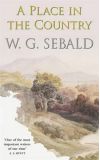
28 Apr 2013 02:29:25
This collection of essays on half a dozen figures mostly little read in English, including the 19th century Swiss writer Gottfried Keller and the Lutheran poet Eduard Mörike, seems at the outset to have all the attributes of a bottom-drawer manuscript, a scraping together of the inimitable East Anglian emigre's stray thoughts on the influences of his youth. The sense is quickly dispelled, however. Sebald was in possession of the uncanny ability to make his own intellectual obsessions, however abstruse, immediately, compulsively his reader's. Who else, you wonder, in any case, could really get away with an opening sentence like this one?
"In the feuilleton which Walter Benjamin wrote for the Magdeburg Zeitung on the centenary of the death of Johann Peter Hebel, he suggests near the beginning that the 19th century cheated itself of the realisation that the Schatzkastlein des Rhenischen Hausfreunds [Treasure Chest of the Rheinland Family Friend] is one of the purest examples of prose writing in all German literature."
Devotees of Sebald's own prose will greet such a sentence not with trepidation but as a familiar welcome mat to the entirely seductive half-reality of digressive memoir and critical biography and lyrical quest which he invented as his own. I remember the first time I read Austerlitz having a powerful sense of being afforded an aerial view of the strange no-man's land of Sebald's interior life, as if hand-held by the writer in the manner of the Ghost of Christmas Past airlifting the nightshirted Scrooge. We are familiar with the idea of the past seeming another country but no contemporary writer in my experience has ever been more adept in giving time the character of Google Earth geography.
This is one of the more grounded of Sebald's books, though of course it arises from the apparatus of more than one journey – for a start, half of the books he dwells on were those he carried in his suitcase when he set out on his pivotal migration from Switzerland to Manchester as a postwar, post-graduate student of German literature in 1966. The essays are linked, in Sebald's mind at least, by a "behavioural disturbance" – shared between them, and with the author – "that causes every emotion to be transformed into letters on the page and which bypasses life with such extraordinary precision…" Like many essential writers he was drawn to subjects that helped him explain himself to himself, people who were, like him, subject to the "awful tenacity of those who devote their lives to writing".
At least one of these lives is familiar, that of Jean-Jacques Rousseau, who Sebald traces in his hyper-productive exile and despair, first on the Ile St Pierre in the Lac de Bienne, later in Wootton in Derbyshire, then Spalding in Lincolnshire, "a godforsaken place set among endless fields of cabbage and beet". The places in the country of the book's title are here, as elsewhere, as much prison as escape.
As the essays progress, other patterns emerge – the writers (he calls them "colleagues") Sebald kept close were instinctive naturalists and cataloguers, annotators and star-gazers looking, like him, for webs of meaning in their often lonely literary projects. His encounter with the novelist Robert Walser, through books and photographs, is perhaps the most affecting of these "extended marginal notes and glosses" to men who were themselves masters of the footnote and addendum.
Sebald claims to see in Walser a reminder of his grandfather, who took him for long formative walks in the country of his childhood, a similarity of bearing that leads him to speculate on "the schemes and symptoms of an order underlying the chaos of human relationships, and applying equally to the living and the dead, which lies beyond our comprehension". Walser withdrew in life first to an attic room, then to an asylum and finally to the "pencil method" of composition – screeds of words only a millimetre high – in which he coded his most indelible work. The trajectory of this life seems emblematic for Sebald of a kind of 20th-century central European journey, born out of the twin demands of the denial of horror and the need to bear witness – territory in which Sebald's own writing was forever mired. You come to see that he prizes Walser, and the others here, for the ingenuity of their strategies of escape from that terrain into the sublime, "those hapless writers trapped in their web of words sometimes succeed in opening up vistas of such beauty and intensity as life itself is scarcely able to provide". Sebald leaves Walser here in a helium balloon, "over a sleeping nocturnal Germany… in a higher, freer realm" – that same kind of transforming condition to which his own writing so stubbornly aspired.

